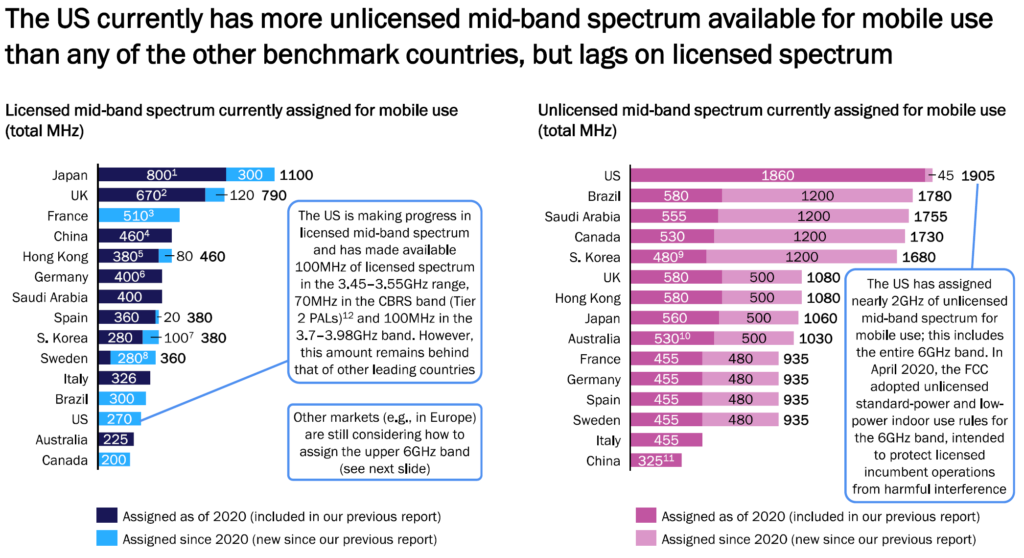Progress on Spectrum Allocation
A year after Congress allowed FCC spectrum auction authority to expire, Senators Thune, Cruz, and Blackburn have made a move to restore it. Their Spectrum Pipeline Act of 2024, S. 3909, directs the FCC to release at least 1,250 MHz of government spectrum for auction within the next two years and 2,500 MHz within five years.
This will help to make the US competitive with the rest of the world on the deployment of 5G and 6G. While we currently have decent allocations in the low band and high band, our mid band position is pathetic. Per Analysis Mason, Japan has allocated 1100 MHz of mid band for licensed, full power use while the US has to get by on 450 MHz.
The lack of licensed, full power mid band spectrum limits the ability of carriers to offer Fixed Wireless Access (FWA) broadband to US consumers. This is great for maintaining the Big Cable hegemony, but it means that many broadband markets are less than fully competitive.
Too Much Unlicensed
While Japan has five times as much licensed mid band as the US, we have nearly twice as much unlicensed mid band, 1905 MHz to 1060. Unlicensed signals, mainly Bluetooth and Wi-Fi, only need to travel 20 feet to cover the typical home while unlicensed has to cover the entire nation, both indoors and outdoors.

Mid Band Spectrum by Nation. Source: Analysis Mason 2022
We got into this mess by coddling Wi-Fi and the Pentagon during the Pai FCC, when 1200 MHz of spectrum between 6 and 7.2 GHz was allocated for unlicensed, low power use. In part, that dubious allocation reflected the political reality of the Defense Department’s lack of willingness to release under-utilized spectrum for full power use.
Technical Considerations
Wi-Fi’s spectrum greed also reflects the historical lack of emphasis by standards makers on efficiency. Until Wi-Fi 6, the major efficiency measure in Wi-Fi was frame aggregation, a trick submitted for IEEE 802.11n by yours truly and my colleagues at Sharp Labs in 2005. It’s even worse than it seems as I first wrote up this idea for my Wi-Fi pioneer client Photonics in 1991, when it was rejected as too complicated.
In Wi-Fi 6, the standards body decided to copy a feature from LTE known as OFDMA, an advanced variant of CDMA that allows multiple devices to share the same spectrum band with each other without the “wait and listen before speaking” CSMA-CA protocol of all previous versions of Wi-Fi. With OFDMA, Wi-Fi access points schedule transmission opportunities for devices using something called “Resource Units” that prevent interference.
I have long maintained that scheduling wireless transmissions was more efficient than fighting for each aggregate with CSMA-CA; it’s good that the standards body has finally seen the wisdom of the approach long used by cellular networks. But there are still way too many pre-Wi-Fi 6 systems in use that are not going away anytime soon.
The Tragedy of Unlicensed
The major shortcoming of unlicensed spectrum is the freedom it provides to users of primitive, inefficient technologies. The FCC and other spectrum managers need the ability to sunset legacy systems when they become impediments to progress.
The Pentagon is a major offender in this regard as well. It has long failed to put modularity and upgradeability into the purchasing specifications for wireless systems, hence it does all it can to block more efficient commercial uses of the frequency bands it uses in obsolete systems.
And Big Cable can hardly be expected to support the release of spectrum that makes it easier for wireless providers to compete for residential broadband service. With the demise of the cable bundle, broadband is the only service cable has to offer over its aging copper networks.
Don’t Let Politics Get in the Way
Unfortunately, the fate of this measure depends on politics. Democrats control the Senate, hence the measure won’t get a hearing without their support. The measure is not partisan in essence, as it addresses a critical need of the national economy.
Passing it now will stimulate the economy, something Dems should want in this election year. It would be great for Dems to sign onto this bill, but predicting political alignments in DC is way above my pay grade.
I can only hope that the Senate can put partisan differences aside and focus on what’s good for the nation. We need more 5G and 6G and we need more competition for broadband.



